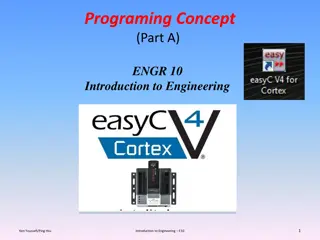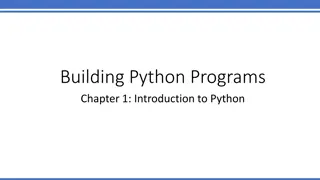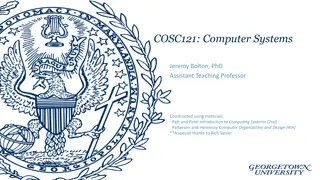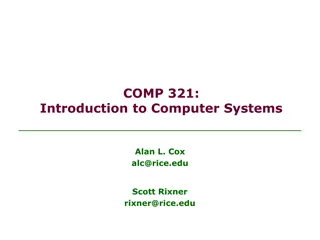Introduction to ECE 454 Computer Systems Programming
This lecture introduces ECE 454, covering administration details, course overview, personnel information, recommended textbooks, communication channels, grading policies, assignment guidelines, and cheating policies. The course emphasizes exams, homework, group assignments, and strict consequences for cheating.
Download Presentation

Please find below an Image/Link to download the presentation.
The content on the website is provided AS IS for your information and personal use only. It may not be sold, licensed, or shared on other websites without obtaining consent from the author.If you encounter any issues during the download, it is possible that the publisher has removed the file from their server.
You are allowed to download the files provided on this website for personal or commercial use, subject to the condition that they are used lawfully. All files are the property of their respective owners.
The content on the website is provided AS IS for your information and personal use only. It may not be sold, licensed, or shared on other websites without obtaining consent from the author.
E N D
Presentation Transcript
ECE 454 Computer Systems Programming Introduction Ding Yuan ECE Dept., University of Toronto http://www.eecg.toronto.edu/~yuan slides courtesy: Greg Steffan
Content of this lecture Administration (personnel, policy, agenda, etc.) Why ECE 454? Overview of the course
Personnel Instructor: Ding Yuan (yuan@eecg.toronto.edu) Office hour: the 10 minutes after each lecture Office: Sandford Fleming 2002E Homepage: http://www.eecg.toronto.edu/~yuan (Michael Stumm will take over later) Teaching Assistants: Arnamoy Bhattacharyya, Seyed Jokar Jandaghi, Yu Luo, Ishita Ray, Hao Wang
Recommended Textbook Textbook is not required The relevant contents will be covered in the slides Google & Wikipedia can tell you all I will post some online resources in Piazza Randal E. Bryant and David R. O Hallaron, Computer Systems: A Programmer s Perspective , 3rd edition, Prentice Hall 2015.
Communications Class web site http://www.eecg.toronto.edu/~yuan/teaching/ece454/ Provides slides, agenda, grading policy, etc. All information regarding to the labs Piazza (see the class web site) used for discussion Q/A & discussion with peers, TAs, prof Quercus is only used for Grades
Policies: Grading Exams (65%) Midterm (25%): TBD Final (40%) Closed book Homework (35%) 5 homeworks (varying % each)
Policies: Assignments Work groups You can work in groups of two for all labs (or individually) You can change groups for each assignment (if you want) No extensions for group changes mid-assignment Don t put assignment code on Internet! Handins Electronic hand-ins only Follow the submit procedure (as specified in lab handout)
Policies: Cheating Cheating is a serious offence, will be punished harshly 0 grade for assignment, potential for official letter in file. What is cheating? Using someone else s solution to finish your assignment to avoid having to understand/learn Sharing code with a non-group-member Copying or retyping What is NOT cheating? Helping others use systems or tools. Helping others with high-level design issues. We do use cheater-beaters Automatically compares your solutions with others
How NotTo pass ECE454 Do not come to lecture It s nice out, the slides are online, and material in the book anyway TRUTH: Lecture material is the basis for exams It is much more efficient to learn through discussion Copy other people s project It is cheating! How can you answer the questions in midterm or final exams?
How NotTo pass ECE454 (2) Do not ask questions in lecture, office hours, or piazza It s scary, I don t want to embarrass myself TRUTH: asking questions is the best way to clarify lecture material at the time it is being presented There is no such things as stupid question Wait until the last couple of days to start a project The project cannot be done in the last few days
Before we start Any questions?
Why Take this Course? Become a superstar programmer Most engineering jobs involve programming Superstar programmers are increasingly in demand A superstar programmer is worth 1000x normal Bill Gates
Why Take this Course? Better understanding of software/hardware interaction Important whether you are a software or hardware type Considering a programming job or grad school Jobs and Entrepreneurial Opportunities Computing is at the heart of most interesting ventures
What Good Programmers Care About 1) Readability 2) Debugability Productivity (choice of language, practice) 3) Reliability 4) Maintainability 5) Scalability Performance (systems understanding) ECE 454 6) Efficiency
Lets be more concrete Suppose you re building The homepage feature void display_homepage (user) { friendlist = get_friendlist (user); foreach (friend in friendlist) { update = get_update_status (friend); display (update); } } How can I double the speed? Easy: TAKE ECE 454!!!
Pre 2005 To improve the performance, just buy a new computer
Recent Intel Processors Processor Chip Moore s Law Year Frequency # Transistors The number of transistors per chip seems to be doubling every 18 months! 1993 Pentium 66MHz 3.1 million 1997 pentium II 300MHz 7.5 million 1999 Pentium III 450MHz 28 million Gordon Moore, 1965 2000 Pentium IV 1.5GHz 42 million
A Multicore Present and Future C C C C C C C P P P P Core 2 Quad Core2 Duo PentiumIV C C C C P P P P C C C C C C C C C C C C C C C C P P C C C C P P 8-core 16-core 2x cores every 1-2yrs: 1000 cores by 2020!?
Only One Sequential Program to Run? void display_homepage (user) { friendlist = get_friendlist (user); foreach (friend in friendlist) { update = get_update_status (friend); display (update); } } Time C C C C P P C C C C C C C C C C P P P C C C C 16-core one core idle 15 cores idle!
Improving Execution Time Single Program: Exec. Time C C C C C need parallel threads to reduce execution time
void display_homepage (user) { friendlist = get_friendlist (user); foreach (friend in friendlist) { pthread_create(fetch_and_display, friend); } } void fetch_and_display (friend) { update = get_update_status (friend); display (update); } fetch_and _display fetch_and _display fetch_and _display fetch_and _display C C C C
Punch line: We Must Parallelize All Software! You will learn it in ECE 454
But So far we only discussed CPU But is it true that faster CPU -> faster program? The same program may run slower on a faster CPU. Why? void display_homepage (user) { friendlist = get_friendlist (user); foreach (friend in friendlist) { update = get_update_status (friend); display (update); } }
Storage hierarchy Your program needs to access data. That takes time!
Numbers everyone should know L1 cache reference 0.5 ns* (L1 cache size: < 10 KB) Branch mispredict 5 ns L2 cache reference 7 ns (L2 cache size: hundreds KB) Mutex lock/unlock 100 ns Main memory reference 100 ns (mem size: GBs) Send 2K bytes over 1 Gbps network 20,000 ns Read 1 MB sequentially from memory 250,000 ns Round trip within same datacenter 500,000 ns Flash drive read 40,000 ns Disk seek 10,000,000 ns (10 milliseconds) Read 1 MB sequentially from network 10,000,000 ns Read 1 MB sequentially from disk 30,000,000 ns Send packet Cal.->Netherlands->Cal. 150,000,000 ns Data from Jeff Dean *1 ns = 1/1,000,000,000 second For a 2.7 GHz CPU (my laptop), 1 cycle = 0.37 ns
Performance optimization is about finding the bottleneck If you can avoid unnecessary disk I/O ---> your program could be 100,000 times faster Have you heard of Facebook s memcached? If you allocate your memory in a smart way ---> your data can fit entirely in cache and your program could be another 100 times faster You will learn this in lab assignments
Back to the Facebook example void display_homepage (user) { friendlist = get_friendlist (user); foreach (friend in friendlist) { pthread_create(fetch_and_display, friend); } } void fetch_and_display (friend) { update = get_update_status (friend); display (update); } Challenge: the data rows are too BIG! 100 Petabytes = 100,000 x my laptop
Back to the Facebook example void display_homepage (user) { friendlist = get_friendlist (user); updates = MULTI_GET ( updates , friendlist); display (updates); } MULTI_GETOptimization 1: parallelization server server server server Opt. 2: Store in memory instead of hard disk memory memory memory memory FriendC FriendB FriendA
Course Breakdown Module 1: Code Measurement and Optimization Module 2: Memory Management and Optimization Module 3A: Multi-core parallelization Module 3B: Multi-machine parallelization
1) Code Measurement and Optimization Topics Finding the bottleneck! code optimization principles measuring time on a computer and profiling Understanding and using an optimizing compiler Assignments HW1: Compiler optimization and program profiling basic performance profiling, finding the bottleneck.
2) Memory Management and Opt. Topics Memory hierarchy Caches and Locality Virtual Memory Note: all involve aspects of software, hardware, and OS Assignments HW2: Optimizing Memory Performance profiling, measurement, locality enhancements for cache performance HW3: Writing your own memory allocator package understanding dynamic memory allocation (malloc)
3) Parallelization Topics A: Parallel/multicore architectures (high-level understanding) Threads and threaded programming Synchronization and performance B: Parallel on multiple machines Big data & cloud computing Assignments HW4: Threads and Synchronization Methods Understanding synchronization and performance HW5: Parallelizing a program Parallelizing and optimizing a program for multicore performance
A big picture Topic 1: code optimization C C Core Cache Cache Cache Topic 3A: multi- core parallelization Topic 2: mem. management Memory Memory Topic 3B: parallelization using the cloud
Homework Schedule HW1: 2 weeks 5% HW2: 2 weeks 7% HW3: 4 weeks 9% HW4: 1.5 weeks 7% HW5: 2 weeks 7% 35% total
The bigger picture Optimization is not the ONLY goal! 1) Readability 2) Debugability More important than performance!!!! 3) Reliability 4) Maintainability 5) Scalability Premature optimization is the root of all evil! 6) Efficiency Donald Knuth
Example 1 Premature optimization causing bugs cp /proc/cpuinfo . Created an empty file!!! (Demo) bool copy_reg (.. ) { if (src.st_size != 0) { /* Copy the file content */ } else { /* skip the copy if the file size = 0 */ } } Premature optimization!!!
Example 2 Optimization might reduce readability int count (unsigned x) { int sum = x; while (x != 0) { x = x >> 1; sum = sum x; } return sum; } int count (unsigned x) { int sum, i; sum = x; for (i = 1; i < 31; i++) { x = rotatel(x, 1); sum = sum + x; } return -sum; } They re both to count the number of 1 bits in x . How could someone else maintain this code?
/* * When I wrote this, only God and * I understood what I was doing. * Now, only God knows */
But how do I know if my optimization is premature ? Hard to answer Make it work; Make it right; Make it Fast --- Butler Lampson Purpose of my program? -- e.g., will it have a long lifetime or it s a one-time thing (e.g., hackathon or ACM programming contest) Am I optimizing for the bottleneck? -- e.g., if the program is doing a lot of I/O, there is no point to optimize for count the number of bits in an integer Am I optimizing for the common case or special case? -- e.g., the cp bug was optimizing for a special case What s the price I pay? e.g., reduced readability, increase program size, etc.
Again, Premature optimization is the root of all evils If you are only going to remember one thing from ECE 454, this is it! And let the fun begin!























